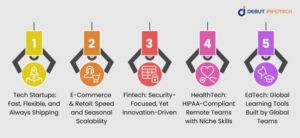Top Industries That Hire Dedicated Development Teams Remotely

Building a startup these days is like trying to reply to emails while your toddler decorates your laptop with peanut butter.
Startup founders have to navigate building an impactful product on a lean budget. As such, many founders are forced to cut corners to stay afloat, often at the expense of product quality, but this defeats the purpose of a startup: rapid growth through innovative solutions.
But what if there were a way to cut costs without the typical trade-off in performance and agility?
This balance between cost-effectiveness and efficiency is the reason why many startups hire Dedicated Development Teams. These teams offer several benefits, including reduced overhead costs and specialized knowledge to help improve your performance.
Indeed, a dedicated software development team can supercharge your project’s success. Still, they aren’t a one-size-fits-all; some industries are more likely than others to reap the benefits of hiring dedicated development teams.
This article aims to highlight the top industries that should consider hiring a dedicated development team and explain how these industries can benefit from doing so. So if you’re a founder, a team lead, or just a curious Joe, you will find it particularly helpful.
What is a dedicated development team?
A dedicated development team is a group of professionals hired to work exclusively on a project.
They work remotely, so you do not need to pay for an office space. Unlike freelancers or one-off contractors, they are employed full-time to work on a specific project or set of projects. This permanence guarantees continuity, control, and commitment over long development cycles.
It’s that simple.
Benefits of Hiring Dedicated Development Teams
So, what do you get when you hire dedicated software development teams?
- Full Control Over Workflow: Working with a dedicated team of developers gives you a degree of control that is not possible with outsourcing. This partnership gives you direct control over roadmaps, priorities, tools, and processes.
- Cost-Efficient Scaling: Are labor costs too expensive in the US? No problem. Just hire offshore development teams and access the best skills at a lot less. This allows you to scale your teams up or down as needed.
- Deep Product Familiarity: Since dedicated teams work closely with your product for an extended period, they have a thorough understanding of it. This guarantees continuity and improves quality.
- Faster Time-to-Market: The continuity that this partnership facilitates eliminates hiring delays, thereby shortening the time-to-market, which is crucial for profitability.
- Long-Term Collaboration: Because they work in a long-term capacity, dedicated teams often develop a strong relationship with your in-house team, which leads to improved communication and trust over time.
Without further ado, here are the industries that hire dedicated development team remotely
Top 5 Industries Hiring Dedicated Development Teams in 2025

The following are the top 5 industries hiring dedicated development teams remotely in 2025.
1. Tech Startups: Fast, Flexible, and Always Shipping
Tech startups are the foremost adopters of remote dedicated development teams. This is because speed, iteration, and cost efficiency are foundational to their success. They need a system that enables them to develop market-ready products in a short period, providing the agility necessary for staying competitive.
Because they require agility, tech startups often lack the luxury of building a local in-house team and often depend on dedicated teams to stay ahead of the curve. Remote developers enable startups to move quickly, access specialized skills, and adapt to sudden changes without the tedious process of assembling a team.
The following are some more specific reasons why a tech startup should hire dedicated remote development teams:
- Scalability without HR overhead: Don’t need so many hands during a development phase? No problem—you can easily scale down, dealing with the headache of terminating contracts and paying severance packages. And if you need more hands again, you can just expand your team at the snap of your fingers. This approach is cost-effective and efficient—you also get to hire the best hands without worrying about onboarding.
- Access to niche skillsets: How does access to the best developers around the world sound? With dedicated development teams, you can bypass the local crunch and hire skilled professionals with niche skillsets in AI, blockchain, or specific development frameworks.
- Faster launch cycles: With team members from around the world, your development process can continue indefinitely. This shortens development time and enables features to be shipped faster.
- Cost efficiency: Hiring highly skilled development teams from regions with lower salary expectations, such as Eastern Europe or Southeast Asia, can save you up to 60% on development costs.
2. E-Commerce & Retail: Speed and Seasonal Scalability
Speed is central to profitability in the e-commerce niche—not simply because you need to outperform your competitors, but because speed significantly impacts customer satisfaction in multiple ways. To keep up with the agility of this industry, you need to build digital infrastructures that evolve with customer needs. What better way to do so than to partner with a team designed for speed and flexibility?
Dedicated development teams help eCommerce businesses stay flexible and agile—they build mobile-friendly online shops, integrate payment systems, and optimize loading times. They are ideal for growing brands that require periodic development support but don’t need full-time engineers on staff year-round.
Key reasons ecommerce companies hire remote developers include the following:
- On-demand development: Instead of keeping a full-time team, ecommerce companies can hire these remote teams to handle ecommerce website development or maintain existing infrastructure, especially during peak periods. This helps keep costs down and profit up.
- Third-party integration: eCommerce companies often call in remote teams to connect platforms like Shopify, WooCommerce, or Magento with CRMs, ERP systems, or advanced analytics tools. Because these dev teams have a long-term relationship, they understand the company infrastructure better and can select the best integration for the company’s processes. This helps to boost customer experience and streamline processes.
- UX/UI improvements: Your user interface and user experience are critical to the success of your business. Remote developers can help improve this by conducting A/B tests, fixing bugs, and rolling out updates with minimal disruptions.
3. Fintech: Security-Focused, Yet Innovation-Driven
Fintech companies face a unique challenge: they must innovate rapidly while complying with stringent regulations surrounding data privacy and security, financial transactions, and identity verification. To do this, you need a team of seasoned professionals with the right set of skills and a wealth of experience under their belt.
While enterprises can afford to hire these high-level professionals, most startups simply don’t have the capacity or budget to do the same. Remote development teams with financial systems expertise offer a practical and scalable solution. These teams possess domain-specific expertise and have access to the latest tools. They are also familiar with compliance protocols. This combination of skill and flexibility makes the best solution for Fintech startups.
Why remote dev teams are common in fintech:
- Specialized knowledge in financial tech: Team members often have experience in the fintech industry, having built banking apps, trading platforms and blockchain protocols in the past. This familiarity helps them navigate the unique challenges of the Financial industry and develop a market-ready, compliant product.
- Built-in compliance workflows: Since they are experienced in developing fintech projects, they understand GDPR, PCI-DSS, KYC, and other legal frameworks that govern financial software.
- API and third-party integration: For your fintech product to function effectively, it requires integration with payment gateways, credit scoring engines, and financial institutions. Remote teams know which will fit best and can fix issues that may arise during the process.
4. HealthTech: HIPAA-Compliant Remote Teams with Niche Skills
Healthcare has seen a period of consistent innovation in recent years—everything from patient records to wearable devices now functions digitally. The integration of technology with traditional medical procedures has led to more efficient, patient-centered care. For startups and enterprises seeking to develop health tech products, compliance with stringent guidelines has become a unique challenge.
With a dedicated development team, you can access skilled professionals who understand the intricacies of guidelines—such as HIPAA, GDPR, and other local laws—like the back of their hand. Today, you can find remote dev teams with compliance-trained developers who can build you secure, reliable, and user-friendly systems that cater to patients and medical professionals alike.
Key reasons healthtech companies hire remote dev teams:
- Telehealth platforms: The telehealth industry has experienced significant growth in the wake of the pandemic. Today, dev teams are in high demand to build appointment systems, video call integrations, and prescription modules.
- IoT and wearables: Wearables have gained popularity over the last decade. To function properly, these devices need complex APIs and real-time dashboards. Remote teams that focus on health tech can build tailored solutions that keep these products running smoothly.
- Clinical research tools: Data is central to research. Remote teams can help research and development teams access quality data by building data collection apps. They can also develop trial management systems tailored to specific research projects.
5. EdTech: Global Learning Tools Built by Global Teams
The pandemic redefined learning.
Without access to physical spaces, institutions relied on digital infrastructures to facilitate learning. Today, students can learn anywhere using their mobile devices. This accessibility has democratized learning, making it available to underserved communities.
Remote dev teams are central to the Edtech revolution—their agile processes and cost efficiency make e-learning more accessible. Companies that work with remote development teams can benefit from a global pool of top talent without incurring significant development costs.
Key reasons edtech companies hire remote dev teams include:
- Scalability across countries: Big learning platforms like Coursera and Duolingo often need to serve users across multiple countries and in various languages. These types of companies prefer to hire offshore development teams, allowing developers to leverage their local knowledge of different markets to help build the underlying infrastructure while keeping costs low.
- Interactive and multimedia-heavy platforms: These teams typically include members with diverse skill sets. This is particularly useful in the Edtech industry, where courses often incorporate videos, simulations, real-time feedback, and quizzes.
- Continuous development: Educational platforms require frequent updates based on user feedback. Since remote development teams are typically agile, they can deliver these updates extremely quickly.
- Budget-conscious development: For nonprofits and public education institutions, remote developers offer the same performance as local hires at a significantly lower rate.
Conclusion
The business world has undergone significant changes over the last few decades. Key drivers include increased competition, customer-centric products, and the need for cost-efficient processes.
Regardless of the industry your business falls under, partnering with a custom software development company will give you access to the best minds across the world while keeping development costs down.
If you’re looking for a company that combines skill and experience, Debut Infotech Pvt Ltd is a great fit for you. Their team includes technical and non-technical experts who will help build compliant, market-ready products.



